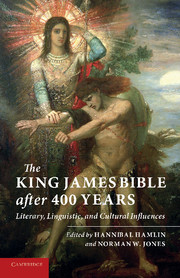Book contents
- Frontmatter
- Contents
- List of Figures
- List of Illustrations
- List of Contributors
- Acknowledgments
- Introduction
- Part I The Language of the King James Bible
- Part II The History of the King James Bible
- Part III Literature and the King James Bible
- 8 Milton, anxiety, and the King James Bible
- 9 Bunyan’s biblical progresses
- 10 Romantic transformations of the King James Bible
- 11 Ruskin and his contemporaries reading the King James Bible
- 12 To the Lighthouse and biblical language
- 13 The King James Bible as ghost in Absalom, Absalom! and Beloved
- 14 The King James Bible and African American literature
- 15 Jean Rhys, Elizabeth Smart, and the “gifts” of the King James Bible
- Chronology of major English Bible translations to 1957
- Chronology of English Bible translations since 1957
- Select bibliography on the King James Bible
- Index of Bible quotations
- General index
- References
14 - The King James Bible and African American literature
Published online by Cambridge University Press: 05 May 2014
- Frontmatter
- Contents
- List of Figures
- List of Illustrations
- List of Contributors
- Acknowledgments
- Introduction
- Part I The Language of the King James Bible
- Part II The History of the King James Bible
- Part III Literature and the King James Bible
- 8 Milton, anxiety, and the King James Bible
- 9 Bunyan’s biblical progresses
- 10 Romantic transformations of the King James Bible
- 11 Ruskin and his contemporaries reading the King James Bible
- 12 To the Lighthouse and biblical language
- 13 The King James Bible as ghost in Absalom, Absalom! and Beloved
- 14 The King James Bible and African American literature
- 15 Jean Rhys, Elizabeth Smart, and the “gifts” of the King James Bible
- Chronology of major English Bible translations to 1957
- Chronology of English Bible translations since 1957
- Select bibliography on the King James Bible
- Index of Bible quotations
- General index
- References
Summary
Prophetic as she was known to be, one wonders if former slave and abolitionist Sojourner Truth would have foreseen such a moment: Barack Obama taking the oath of office with his hand on the Lincoln Bible as he became the first African American president of the United States. In 1864, her own visit with President Abraham Lincoln at the “Executive Mansion” (or White House) was captured in a portrait as iconic in the nineteenth century as is the image of Obama’s inauguration in the twenty-first (see Illustration 6). Truth’s presence with Lincoln at the White House in 1864 represents a transgression of racial and gendered norms of mid-nineteenth-century America. In the portrait, she is gazing out at the viewer while Lincoln’s gaze is focused on the open Bible, his left hand appearing to have just turned the page. Truth, who could not read or write, does not look at the text, but gestures to it with her right hand. The triangle formed by the three subjects of the portrait – Lincoln, Truth, the King James Bible – suggests the desire for the Bible to serve as a text of national unity. This is the reason President Obama chose this Bible specifically for his historic inauguration.
Of course the small, red-leather-bound volume upon which Obama’s left hand rested on January 20, 2009 is not the same as the imposing volume in the portrait of Lincoln and Truth. In a letter dated November 17, 1864 from Freedman’s Village, Virginia where she was working with a refugee camp of freedpeople, Truth wrote (with the aid of an amanuensis):
He then showed me the Bible presented to him by the colored people of Baltimore, of which you have no doubt seen a description. I have seen it for myself, and it is beautiful beyond description. After I had looked it over, I said to him, This is beautiful indeed; the colored people have given this to the head of the government, and that government once sanctioned laws that would not permit its people to learn enough to enable them to read this book.
(178–9)- Type
- Chapter
- Information
- The King James Bible after Four Hundred YearsLiterary, Linguistic, and Cultural Influences, pp. 294 - 317Publisher: Cambridge University PressPrint publication year: 2010

